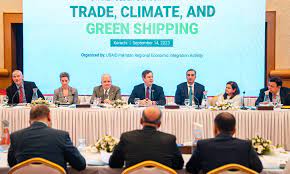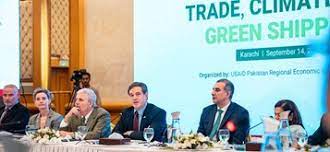US reaffirms commitment to green shipping

Liaquat Ali
Karachi: The United States reaffirmed its commitment to partnering with the Government of Pakistan and the port and shipping industry to develop a national action. This plan will encourage more sustainable shipping practices to prevent global climate change and enhance Pakistan’s trade competitiveness. U.S. Deputy Chief of Mission Andrew Schofer co-hosted the second Green Shipping roundtable with Office of the Prime Minister Political Secretary and Chairman for Strategic Reforms Unit Hussain Islam and Ministry of Maritime Affairs Director General for Ports and Shipping Alia Shahid. Together they underlined the need for immediate and collective action to address climate change.
Mr. Schofer delivered keynote remarks, underscoring the crucial role of sustainable shipping practices in mitigating the impact of climate change. Joined by Consul General Conrad Tribble and representatives from the U.S. Agency for International Development (USAID) and U.S. Department of Energy, Mr. Schofer emphasized the need for conversations to address these issues. “Given our shared climate challenges, it is imperative that we engage in robust bilateral dialogues. Today is a testament to our commitment to a sustainable and climate-resilient future, one that will benefit not only us but generations to come.”

The Green Shipping roundtable stakeholders discussed opportunities to reduce carbon emissions in the port, shipping, and logistics sectors in Pakistan. Port authorities, industry, and other key actors in the ports and shipping value chain discussed how to promote environmentally friendly and sustainable shipping practices in Pakistan and ways to support the Green Shipping Challenge at COP28.
The United States and Norway launched the Green Shipping Challenge at COP27. The U.S. Mission in Pakistan, through USAID’s Pakistan Regional Economic Integration Activity (PREIA), organized this roundtable as a follow-on to the June 1 stakeholder consultation and the August 17-18 technical working group meetings.
The United States and Pakistan have a long history of working together to advance economic growth and build a brighter future for Pakistan. In the 1960s, the United States supported Pakistan’s “Green Revolution,” improving crop yields, boosting economic opportunities for Pakistanis, and increasing food security and life expectancy. Building on this foundation, the U.S.-Pakistan “Green Alliance” framework advances cooperation in agriculture, clean energy, and water. The United States is committed to support Pakistan as it strengthens climate resilience, pursues energy transformation, and fosters inclusive economic growth.





